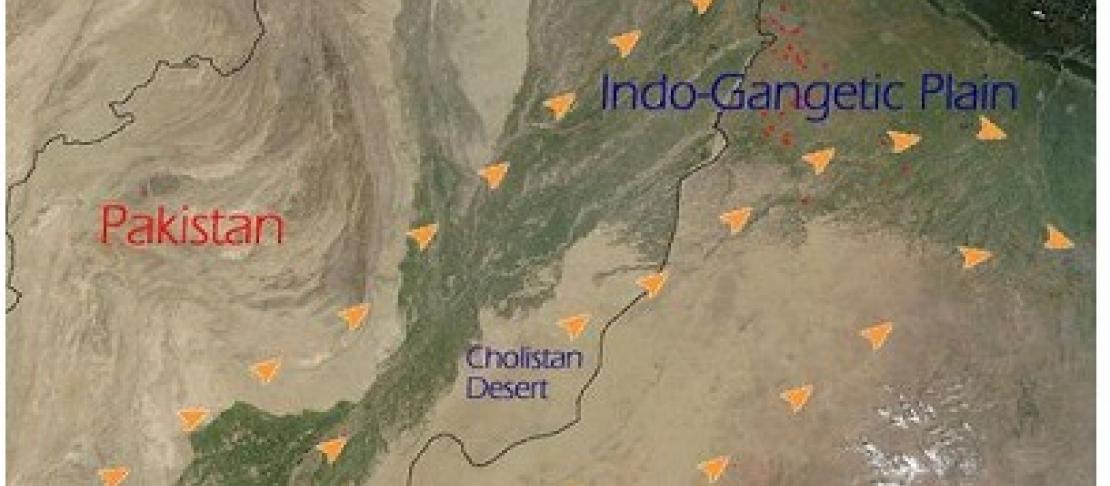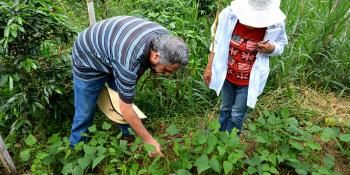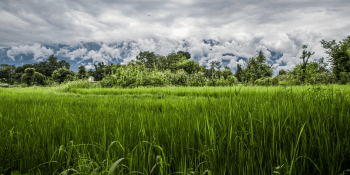A farmer-based experimentation network in the IGP

Beginning in October, CCAFS partner Bioversity International will give farmers in the Indo-Gangetic Plains (IGP) access to different seeds and allow them to freely experiment. The researchers will then track the results and facilitate inter-farmer exchanges of information and experiences, creating a new network of agricultural knowledge.
The Indo-Gangetic Plains (IGP) region, formed by the fluvial action of the Indus and Ganges River systems, is one of the world’s most important food grain producing regions. Its 13.5 million hectares of farmland account for over 30% of the rice and 42% of the wheat grown in India, Pakistan, Bangladesh and Nepal; 15% of global wheat production; and, most impressively, 21% of the food stock worldwide. The region also supports some of the most densely populated areas on earth, with more than 300 million people dependent on the predominant rice-wheat cropping system.
Hence, IGP is a socially significant and economically strategic domain of India; however it is also environmentally sensitive, and its landscape, hydrology and fertility are increasingly being threatened by climate warming and anthropogenic pressure. Future climate scenarios suggest that, by 2050, as much as 51% of the IGP region might be reclassified as a heat-stressed, irrigated, short-season production mega-environment.
This shift would represent a significant reduction in wheat yields, threatening the food security of millions, unless appropriate cultivars and crop management practices are available to and adopted by local farmers. There is an urgent need to identify existing wheat genetic resources for climate change adaptation to ensure sustainable production in the IGP region, particularly at a local level. In addition, the local seed system must be strengthened to provide farmers with increased access to crop diversity for the selection of better adapted varieties to mitigate climate change risks.
In order to address the issues mentioned above, CCAFS has teamed up with Bioversity International’s South Asia Office (located in New Delhi) to establish a "farmer-based experimentation network" in the IGP region. The project aims to:
- Explore means of strengthening the link between genebanks and local farmers in the context of adaptation to climate risks;
- Understand the role of seed systems in enabling adaptation under changing production constraints;
- Understand social and cultural barriers to adoption of adapted landraces and varieties and explore effective means of introducing new adapted landraces and varieties taking into account these barriers.
Ultimately, the project seeks to establish a farmer-based experimentation network in the IGP region for on-farm participatory testing and visualization in order to investigate whether a wider range of agriculture diversity in key crops important for food security enhances the adaptive capacity of farmers in areas experiencing climate variability and change.
Given the limited time-frame and based on available funds, the project will focus on one crop: wheat. Project sites will be selected from the five transects* of the IGP, representing a heterogeneous and environmentally diverse area displaying altitudinal/climatic gradients. There will be 10 to 15 participating local farmers per location, for a total of at least 50 on-farm demonstration sites. However, the exact number of project sites and number of on-farm demonstration field sites will depend on resources available and the interest of farmers and farming communities at each location.
The project will utilize a participatory approach, allowing farmers to freely experiment with the supplied crop diversity during the on-farm trials. Farmers will be permitted and encouraged to manage the crop selection for the trials, according to their own preferences and needs. Farmer visits across different sites will be organized in order to promote knowledge-sharing and enable farmers to learn from one another's experience in adapting to climate change; this will further strengthen the existing local seed system networks in the IGP. The project will also address gender gaps, engaging both male and female farmers in the on-farm trials and in project implementation.
 Inception workshops at project sites, on-farm field trials, and farmer field visits are all scheduled to begin in October. (Check back for updates!)
Inception workshops at project sites, on-farm field trials, and farmer field visits are all scheduled to begin in October. (Check back for updates!)
The goal for the project is to enable local communities in IGP region to successfully adapt their food production systems to climatic changes, maintaining or even improving their food security and livelihood in the longer term. The project sites established will be used as a resource to continuously monitor how farmers are able to cope with climate change. The plan will also utilize measurable indicators and innovative tools, such as still and video images, to document how farmers are coping with climate change over time. Analyzing data regarding farmer preferences and enhanced seed systems will also enable researchers and policy-makers to better craft strategies that would appropriately accelerate adaptation at the community level.
*Based on its physiography and bioclimates, the region can be subdivided into five broad transects. The trans-Gangetic plains (Transects 1 and 2) occupy large areas of east Punjab (Pakistan), west Punjab (India) and Haryana (India). Transects 3 and 4 comprise the areas of the upper and middle Gangetic plains in western-central and eastern Uttar Pradesh, Bihar and the Terai of Uttaranchal in India and Nepal. The lower parts of the IGP in west Bengal (India) and parts of Bangladesh constitute Transect 5.
Photo credits: Map - NASA; Photo - Andrew Miller


